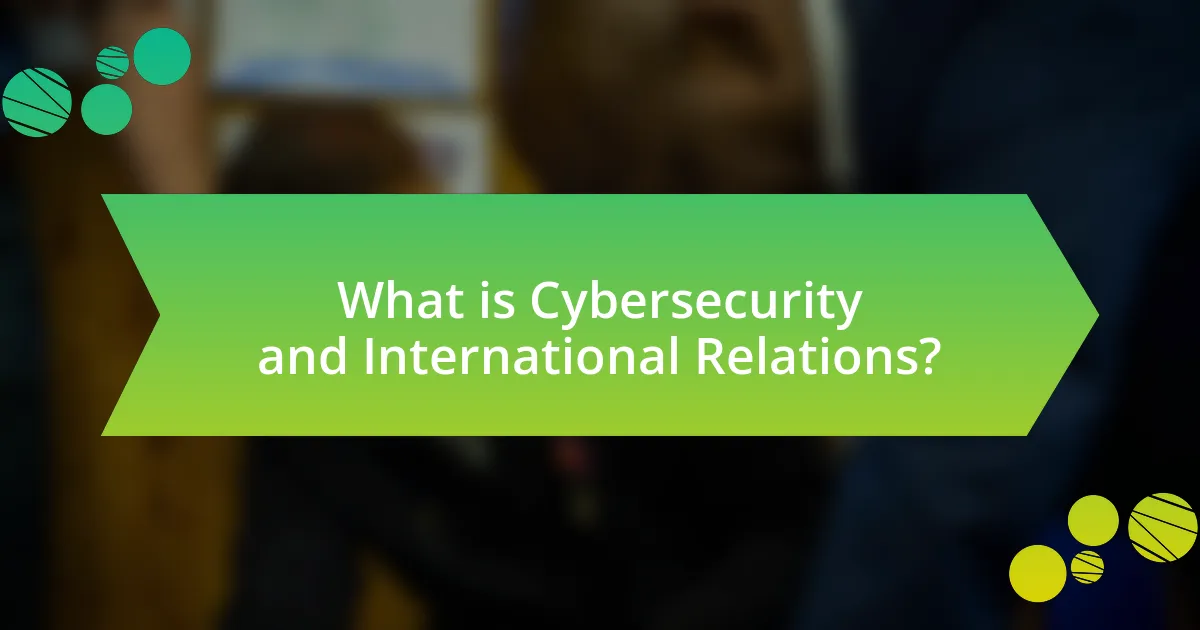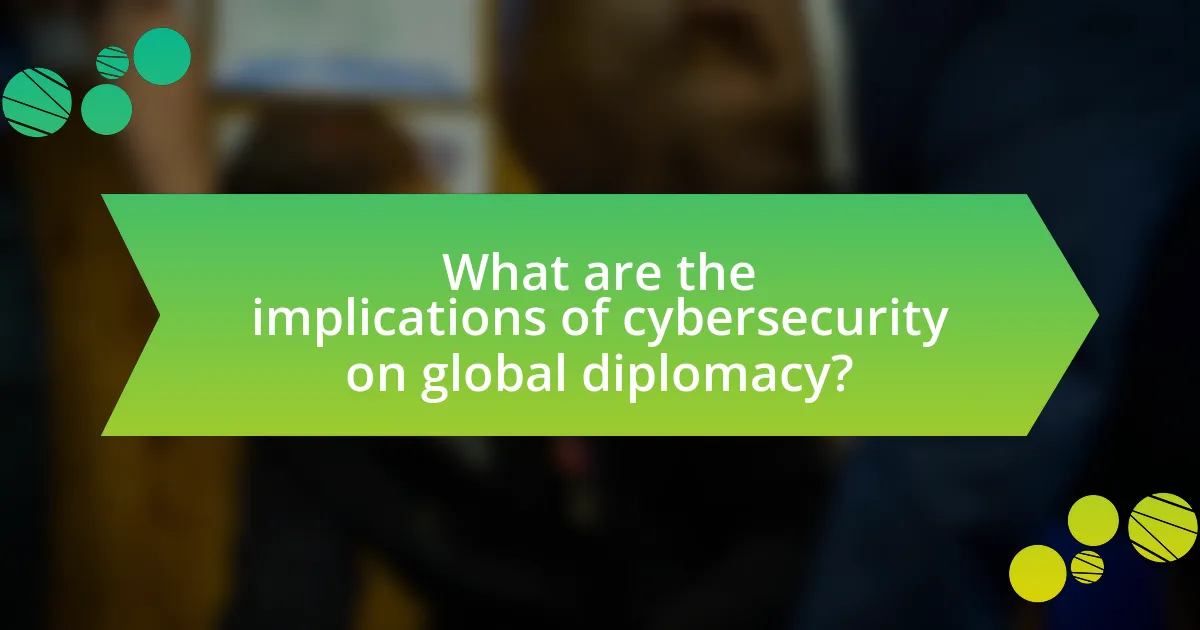Cybersecurity and International Relations represent the critical intersection of digital security and the diplomatic interactions among nations. As cyber threats increasingly undermine national security and international stability, countries are prioritizing cybersecurity within their foreign policy frameworks. This article explores how cybersecurity influences diplomatic relations, the perception of cyber threats by nation-states, and the emerging trends in international governance. Key concepts such as state-sponsored cyberattacks, cyber diplomacy, and the establishment of global norms are examined, highlighting the necessity for collaborative efforts to address the complexities of cybersecurity in a globalized world. Additionally, the article discusses the challenges of creating international cybersecurity agreements and the role of technology in shaping future governance strategies.

What is Cybersecurity and International Relations?
Cybersecurity and International Relations refer to the intersection of digital security measures and the diplomatic, political, and strategic interactions between nations. This relationship has become increasingly significant as states recognize that cyber threats can undermine national security, influence international stability, and affect economic interests. For instance, the 2016 U.S. presidential election interference highlighted how cyber operations can impact political processes and international relations. As a result, countries are now prioritizing cybersecurity in their foreign policy agendas, leading to new governance frameworks that address both cyber threats and international cooperation.
How do cybersecurity and international relations intersect?
Cybersecurity and international relations intersect through the increasing reliance on digital infrastructure, which has become a critical component of national security. As nations engage in cyber warfare, espionage, and the protection of sensitive information, the dynamics of international relations are influenced by the need for cybersecurity measures. For instance, the 2016 U.S. presidential election interference by Russian hackers exemplifies how cyber activities can strain diplomatic relations and lead to sanctions. Additionally, international agreements, such as the Paris Call for Trust and Security in Cyberspace, highlight the collaborative efforts among countries to establish norms and frameworks for responsible behavior in cyberspace, further intertwining cybersecurity with global governance.
What are the key concepts in cybersecurity relevant to international relations?
Key concepts in cybersecurity relevant to international relations include state-sponsored cyberattacks, cyber diplomacy, cyber norms, and critical infrastructure protection. State-sponsored cyberattacks involve nation-states using cyber capabilities to achieve political or military objectives, exemplified by incidents like the 2016 U.S. election interference attributed to Russian hackers. Cyber diplomacy refers to the efforts by countries to negotiate agreements and establish norms governing state behavior in cyberspace, as seen in initiatives like the Paris Call for Trust and Security in Cyberspace. Cyber norms are the shared expectations about responsible state behavior in cyberspace, which are crucial for maintaining international stability. Critical infrastructure protection focuses on safeguarding essential services, such as energy and communication systems, from cyber threats, highlighted by the 2021 Colonial Pipeline ransomware attack that disrupted fuel supply in the U.S. These concepts illustrate the intersection of cybersecurity and international relations, emphasizing the need for collaborative governance in the digital age.
How do nation-states perceive cybersecurity threats?
Nation-states perceive cybersecurity threats as significant risks to national security, economic stability, and public safety. This perception is driven by the increasing frequency and sophistication of cyberattacks, which can disrupt critical infrastructure, steal sensitive information, and undermine trust in governmental institutions. For instance, the 2020 SolarWinds cyberattack, attributed to state-sponsored actors, highlighted vulnerabilities in supply chains and prompted nations to reassess their cybersecurity strategies. Additionally, reports from organizations like the Cybersecurity and Infrastructure Security Agency (CISA) indicate that nation-states view cyber threats as tools for geopolitical leverage, leading to a heightened focus on developing robust defensive and offensive cyber capabilities.
Why is cybersecurity becoming a critical issue in international governance?
Cybersecurity is becoming a critical issue in international governance due to the increasing frequency and sophistication of cyberattacks that threaten national security, economic stability, and public safety. Governments worldwide are recognizing that cyber threats can disrupt essential services, steal sensitive information, and undermine trust in institutions. For instance, the 2020 SolarWinds cyberattack, which affected multiple U.S. government agencies and private companies, highlighted vulnerabilities in national cybersecurity frameworks and the need for international cooperation to address these challenges. As a result, nations are prioritizing cybersecurity in their diplomatic agendas, leading to the establishment of global norms and collaborative efforts to enhance cyber resilience.
What role does cybersecurity play in national security strategies?
Cybersecurity is integral to national security strategies as it protects critical infrastructure, sensitive data, and national interests from cyber threats. Governments recognize that cyberattacks can disrupt essential services, compromise national defense, and undermine public trust. For instance, the 2020 SolarWinds cyberattack demonstrated how vulnerabilities in cybersecurity can lead to significant breaches affecting multiple federal agencies, highlighting the necessity for robust cybersecurity measures in national security frameworks. Additionally, the U.S. National Cyber Strategy emphasizes the importance of securing cyberspace to deter adversaries and safeguard the nation’s economic and security interests.
How do international organizations address cybersecurity challenges?
International organizations address cybersecurity challenges through collaborative frameworks, policy development, and capacity building. For instance, the United Nations has established the Group of Governmental Experts on Cybersecurity to promote norms and confidence-building measures among member states. Additionally, the International Telecommunication Union provides technical assistance and guidelines to enhance national cybersecurity strategies. These efforts are supported by data indicating that countries with collaborative cybersecurity frameworks experience fewer cyber incidents, demonstrating the effectiveness of international cooperation in mitigating cybersecurity risks.

What are the implications of cybersecurity on global diplomacy?
Cybersecurity significantly impacts global diplomacy by reshaping power dynamics and influencing international relations. As nations increasingly rely on digital infrastructure, vulnerabilities in cybersecurity can lead to diplomatic tensions, as seen in incidents like the 2016 U.S. election interference attributed to Russian hackers. This event exemplifies how cyber threats can undermine trust between countries and provoke retaliatory actions, thereby altering diplomatic strategies. Furthermore, the rise of cyber warfare necessitates new treaties and cooperative frameworks, as countries must navigate the complexities of cyber norms and regulations to prevent conflicts. The integration of cybersecurity into diplomatic discussions reflects its critical role in maintaining national security and fostering international cooperation.
How does cybersecurity influence diplomatic relations between countries?
Cybersecurity significantly influences diplomatic relations between countries by shaping trust and cooperation in international interactions. When nations experience cyberattacks, they often attribute blame to specific states, which can lead to heightened tensions or conflict. For instance, the 2016 U.S. presidential election interference attributed to Russian hackers strained U.S.-Russia relations, resulting in sanctions and diplomatic expulsions. Furthermore, countries that prioritize cybersecurity collaboration, such as through treaties or joint cybersecurity exercises, can enhance mutual trust and stability. The establishment of frameworks like the Budapest Convention on Cybercrime illustrates how international agreements can foster cooperation and mitigate risks associated with cyber threats.
What are the consequences of cyberattacks on international relations?
Cyberattacks significantly disrupt international relations by escalating tensions between nations, undermining trust, and prompting retaliatory actions. For instance, the 2016 U.S. presidential election interference attributed to Russian hackers strained U.S.-Russia relations, leading to sanctions and diplomatic expulsions. Additionally, cyberattacks can provoke military responses, as seen when Israel reportedly conducted cyber operations against Iranian nuclear facilities, illustrating how cyber warfare can influence geopolitical strategies. The increasing frequency of cyber incidents also compels nations to enhance their cybersecurity measures, which can lead to an arms race in cyber capabilities, further complicating diplomatic engagements.
How do countries collaborate on cybersecurity initiatives?
Countries collaborate on cybersecurity initiatives through bilateral agreements, multilateral organizations, and information-sharing platforms. For instance, the European Union has established the General Data Protection Regulation (GDPR) to harmonize data protection laws among member states, enhancing collective cybersecurity efforts. Additionally, the NATO Cooperative Cyber Defence Centre of Excellence facilitates collaboration among member countries by providing training, research, and sharing best practices in cybersecurity. Furthermore, the Global Forum on Cyber Expertise (GFCE) promotes international cooperation by connecting countries to share knowledge and resources, thereby strengthening global cybersecurity resilience. These collaborative frameworks demonstrate a concerted effort to address the growing challenges posed by cyber threats on an international scale.
What are the challenges of establishing international cybersecurity norms?
Establishing international cybersecurity norms faces significant challenges, primarily due to differing national interests and regulatory frameworks. Countries often prioritize their own security and economic interests, leading to conflicting approaches to cybersecurity governance. For instance, the United States emphasizes a free and open internet, while countries like China advocate for strict state control over cyberspace. Additionally, the lack of a universally accepted definition of cyber threats complicates consensus-building. According to a 2021 report by the United Nations Institute for Disarmament Research, the absence of binding international agreements on cybersecurity exacerbates the risk of cyber conflicts, as nations may interpret actions differently, leading to miscalculations and escalations. Furthermore, the rapid evolution of technology outpaces regulatory efforts, making it difficult to create norms that remain relevant and effective.
What obstacles do nations face in creating cybersecurity agreements?
Nations face several obstacles in creating cybersecurity agreements, primarily due to differing national interests, legal frameworks, and levels of technological advancement. These differences can lead to conflicting priorities, making it challenging to establish a unified approach to cybersecurity. For instance, countries may prioritize national security over international cooperation, resulting in reluctance to share critical information or collaborate on cybersecurity initiatives. Additionally, varying legal definitions of cybercrime and data protection laws complicate the negotiation process, as nations must reconcile their domestic regulations with international standards. Furthermore, disparities in technological capabilities can create imbalances in negotiations, where more advanced nations may dominate discussions, leaving less developed countries at a disadvantage. These factors collectively hinder the formation of effective and comprehensive cybersecurity agreements among nations.
How do differing national interests affect cybersecurity governance?
Differing national interests significantly affect cybersecurity governance by creating divergent priorities and strategies among countries. For instance, nations prioritize their own security, economic interests, and political agendas, leading to inconsistent approaches to cybersecurity policies and international cooperation. The United States, for example, emphasizes protecting critical infrastructure and countering cyber threats from state actors, while countries like China may focus on internet sovereignty and controlling information flow. This divergence can result in fragmented global cybersecurity frameworks, as evidenced by the lack of consensus on norms and regulations, which complicates collaborative efforts to address transnational cyber threats.

What are the emerging trends in cybersecurity and international relations?
Emerging trends in cybersecurity and international relations include the increasing importance of cyber diplomacy, the rise of state-sponsored cyberattacks, and the growing emphasis on international cybersecurity norms and frameworks. Cyber diplomacy is becoming essential as nations seek to establish cooperative agreements to manage cyber threats, exemplified by initiatives like the Paris Call for Trust and Security in Cyberspace, which aims to foster global collaboration. State-sponsored cyberattacks are escalating, with incidents such as the SolarWinds attack highlighting vulnerabilities in national security and prompting countries to enhance their cyber defenses. Furthermore, international organizations, including the United Nations, are advocating for the development of cybersecurity norms to promote responsible state behavior in cyberspace, as seen in the UN Group of Governmental Experts’ reports on cybersecurity. These trends reflect a shift towards recognizing cybersecurity as a critical component of national and international security strategies.
How is technology shaping the future of cybersecurity in global governance?
Technology is significantly shaping the future of cybersecurity in global governance by enhancing threat detection, response capabilities, and international collaboration. Advanced technologies such as artificial intelligence and machine learning enable real-time analysis of vast amounts of data, allowing for quicker identification of cyber threats and vulnerabilities. For instance, the integration of AI in cybersecurity systems has been shown to reduce response times to incidents by up to 90%, according to a report by the Ponemon Institute. Furthermore, technology facilitates the establishment of international frameworks and agreements, such as the Budapest Convention on Cybercrime, which promotes cooperation among nations to combat cybercrime effectively. This collaborative approach is essential as cyber threats often transcend national borders, necessitating a unified global response.
What role do artificial intelligence and machine learning play in cybersecurity?
Artificial intelligence (AI) and machine learning (ML) play a crucial role in enhancing cybersecurity by enabling systems to detect, analyze, and respond to threats in real-time. AI algorithms can process vast amounts of data to identify patterns indicative of cyber threats, while ML models improve their accuracy over time by learning from new data and previous incidents. For instance, according to a report by McKinsey, organizations that implement AI-driven cybersecurity measures can reduce the time to detect and respond to threats by up to 90%. This capability allows for proactive threat management, minimizing potential damage from cyberattacks and improving overall security posture.
How are cyber threats evolving in the context of international relations?
Cyber threats are evolving in the context of international relations through increased state-sponsored cyberattacks, the rise of ransomware targeting critical infrastructure, and the use of cyber capabilities for geopolitical leverage. State actors, such as Russia and China, have demonstrated the ability to conduct sophisticated cyber operations that disrupt political processes and undermine national security, as seen in incidents like the 2016 U.S. presidential election interference. Additionally, ransomware attacks, such as the Colonial Pipeline incident in 2021, highlight vulnerabilities in essential services, prompting nations to reconsider their cybersecurity strategies and international cooperation. This evolution reflects a shift in how countries perceive and respond to threats, emphasizing the need for robust governance frameworks to address the complexities of cybersecurity in a globalized world.
What best practices can nations adopt for effective cybersecurity governance?
Nations can adopt several best practices for effective cybersecurity governance, including establishing a national cybersecurity strategy, fostering public-private partnerships, and implementing robust regulatory frameworks. A national cybersecurity strategy provides a comprehensive approach to managing cyber risks, as evidenced by the United States’ National Cyber Strategy, which outlines priorities and actions to enhance national security and economic prosperity. Public-private partnerships facilitate information sharing and collaboration between government and industry, exemplified by initiatives like the Cybersecurity Information Sharing Act, which encourages the exchange of threat intelligence. Additionally, implementing regulatory frameworks, such as the General Data Protection Regulation in the European Union, ensures that organizations adhere to security standards, thereby enhancing overall cybersecurity resilience. These practices collectively contribute to a more secure cyber environment and effective governance.
How can countries enhance their cybersecurity resilience?
Countries can enhance their cybersecurity resilience by implementing comprehensive national cybersecurity strategies that include robust policies, frameworks, and collaboration among public and private sectors. For instance, the establishment of the National Institute of Standards and Technology (NIST) Cybersecurity Framework in the United States has provided a structured approach for organizations to manage and reduce cybersecurity risk, demonstrating the effectiveness of a coordinated strategy. Additionally, investing in cybersecurity education and workforce development is crucial; according to the Cybersecurity Workforce Study by (ISC)², there is a global shortage of 3.4 million cybersecurity professionals, highlighting the need for countries to cultivate skilled talent to bolster their defenses. Furthermore, fostering international cooperation through information sharing and joint exercises can enhance collective cybersecurity capabilities, as evidenced by initiatives like the European Union’s Cybersecurity Strategy, which emphasizes collaboration among member states to address cross-border cyber threats.
What strategies can be implemented for international cooperation in cybersecurity?
International cooperation in cybersecurity can be enhanced through strategies such as establishing global norms, fostering information sharing, and creating joint response frameworks. Establishing global norms involves countries agreeing on acceptable behaviors in cyberspace, which can reduce conflicts and promote stability. For instance, the United Nations has initiated discussions on cybersecurity norms, emphasizing the importance of state responsibility in preventing cybercrime.
Fostering information sharing among nations can be achieved through platforms like the Global Forum on Cyber Expertise, which facilitates collaboration and knowledge exchange on cybersecurity threats and best practices. This approach has been shown to improve national defenses against cyber threats by leveraging collective intelligence.
Creating joint response frameworks allows countries to coordinate their efforts during cyber incidents, as seen in the NATO Cooperative Cyber Defence Centre of Excellence, which provides a collaborative environment for member states to develop and implement cybersecurity strategies. These strategies collectively enhance resilience against cyber threats on a global scale.
What are the key takeaways for policymakers in cybersecurity and international relations?
Policymakers in cybersecurity and international relations must prioritize collaboration, as cyber threats often transcend national borders and require coordinated responses. Effective international agreements, such as the Paris Call for Trust and Security in Cyberspace, emphasize the importance of shared norms and principles among nations to enhance global cybersecurity. Additionally, investing in cybersecurity infrastructure and workforce development is crucial, as evidenced by the increasing number of cyberattacks, which reached 1,000 per day in 2020 according to the Cybersecurity and Infrastructure Security Agency (CISA). Lastly, integrating cybersecurity into national security strategies is essential, as cyber capabilities can significantly impact geopolitical dynamics, demonstrated by incidents like the 2016 U.S. election interference.






